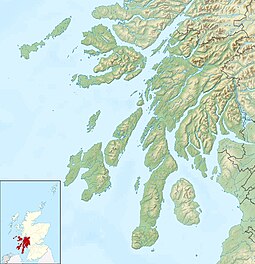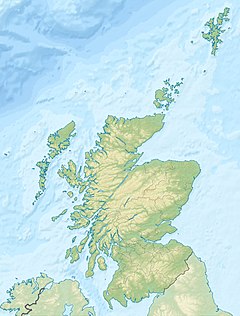Davaar
| Gaelic name | Eilean Dà Bhàrr |
|---|---|
| Meaning of name | "Barr's island" |
 Davaar Island and Lighthouse |
|
| Location | |
|
Davaar Island shown within Argyll and Bute
|
|
| OS grid reference | NR760200 |
| Coordinates | 55°25′N 5°32′W / 55.42°N 5.54°W |
| Physical geography | |
| Island group | Firth of Clyde |
| Area | 52 ha |
| Area rank | 198 |
| Highest elevation | 115 m |
| Administration | |
| Sovereign state | United Kingdom |
| Country | Scotland |
| Council area | Argyll and Bute |
| Demographics | |
| Population | 0 |
| References | |

Davaar Island Lighthouse
|
|
|
Scotland
|
|
| Location | Davaar Island Campbeltown Loch Argyll and Bute Scotland United Kingdom |
|---|---|
| Coordinates | 55°25′42″N 5°32′26″W / 55.428209°N 5.540505°W |
| Year first constructed | 1854 |
| Automated | 1983 |
| Construction | masonry tower |
| Tower shape | cylindrical tower with balcony and lantern |
| Markings / pattern | white tower, black lantern, ochre trim |
| Height | 20 metres (66 ft) |
| Focal height | 37 metres (121 ft) |
| Light source | mains power |
| Intensity | 300,000 candela |
| Range | 23 nautical miles (43 km; 26 mi) |
| Characteristic | Fl (2) W 10s. |
| Admiralty number | A4276 |
| NGA number | 4252 |
| ARLHS number | SCO-059 |
| Managing agent |
Northern Lighthouse Board |
Northern Lighthouse Board
Davaar Island or Island Davaar (Scottish Gaelic: Eilean Dà Bhàrr) is located at the mouth of Campbeltown Loch off the east coast of Kintyre, in Argyll and Bute, Scotland. It is a tidal island, linked to the mainland by a natural shingle causeway called the Dhorlin near Campbeltown at low tide. The crossing can be made in around 40 minutes.
Davaar was known as the island of Sanct Barre between the years 1449 to 1508. The modern form Davaar is from older Do Bharre - thy St Barre. Dr Gillies in his "Place Names of Argyll" appears to accept the popular derivation, Double-pointed (Da-Bharr) Island.
In 1854, a Lighthouse was built on the north of the island by the lighthouse engineers David and Thomas Stevenson. The lighthouse was automated in 1983, and today, Davaar is inhabited by caretakers, sheep, goats and mink.
The Lookout, a square building standing on a small knoll close to the lighthouse, was built during World War Two to house naval crews, whose task it was to stretch anti-submarine nets across the water, protecting Campbeltown. It is now rented out as a holiday home.
The island is also known for its seven caves, one of which contains a life size cave painting depicting the crucifixion, painted in 1887 by local artist Archibald MacKinnon after he had a vision in a dream suggesting him to do so. The painting caused uproar in the area as it was seen as a sign from God; it is said that when the townsfolk discovered it was MacKinnon, and not God, he was exiled from the town indefinitely. Restored several times since, including twice by the original artist, the painting was vandalised in July 2006, having a red and black depiction of Che Guevara painted over the original masterpiece. It has since been restored again.
...
Wikipedia


